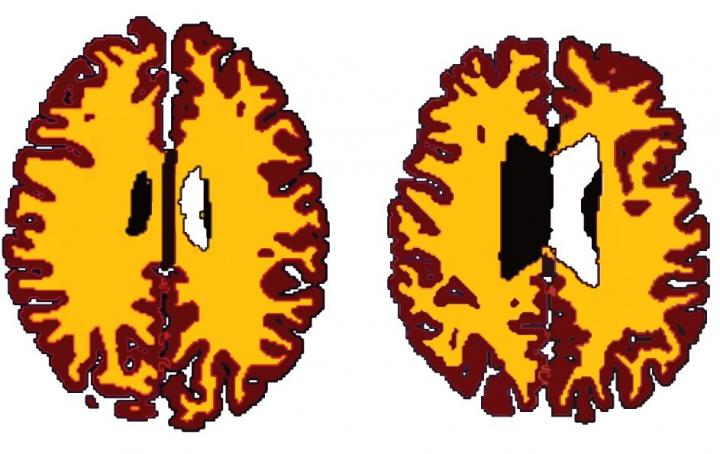The brain is particularly sensitive during the middle years.
The brains of obese individuals are physiologically 10 years older than lean individuals, new research finds.
Scientists looked at the brain’s white matter.
The white matter is the tissue that connects the areas and enables them to communicate with each other.
(In the images above, the white matter, confusingly, is in yellow, and it shows one subject with a BMI of 19.5 on the left and another with a BMI of 43.4 on the right.)
Dr Lisa Ronan, first author of this study, said:
“As our brains age, they naturally shrink in size, but it isn’t clear why people who are overweight have a greater reduction in the amount of white matter.
We can only speculate on whether obesity might in some way cause these changes or whether obesity is a consequence of brain changes.”
The study looked at the brains of 473 people aged between 20 and 87.
Overweight individuals had significantly less white matter in their brains than lean individuals.
The differences were only seen from middle-age onwards.
Professor Paul Fletcher, senior author of the study, added:
“We’re living in an ageing population, with increasing levels of obesity, so it’s essential that we establish how these two factors might interact, since the consequences for health are potentially serious.
The fact that we only saw these differences from middle-age onwards raises the possibility that we may be particularly vulnerable at this age.
It will also be important to find out whether these changes could be reversible with weight loss, which may well be the case.”
Professor Sadaf Farooqi, co-author of the study, said:
“We don’t yet know the implications of these changes in brain structure.
Clearly, this must be a starting point for us to explore in more depth the effects of weight, diet and exercise on the brain and memory.”
Despite the differences in brain volume, there were no deficits in cognitive abilities in overweight or obese people.
The study was published in the journal Neurobiology of Aging (Ronan et al., 2016).
Image credit: Dr Lisa Ronan

